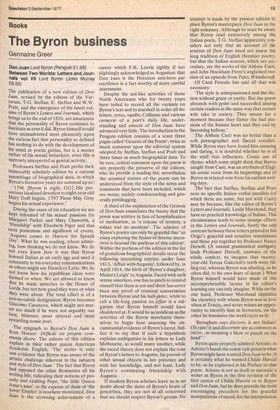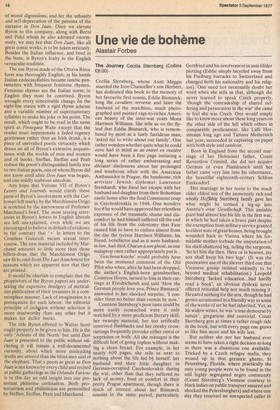Books
The Byron business
Germaine Greer
Don Juan Lord Byron (Penguin £1 .95) Between Two Worlds: Letters and Journals vol VII Lord Byron (John Murray £6.50) The publication of a new edition of Don Juan, revised by the editors of the Variorum, T.G. Steffan, E. Steffan and W.W. Pratt, and the emergence of the latest volume of Byron's Letters and Journals, which brings us to the end of 1820, are assurances that the personality of Byron continues to fascinate as ever it did. Byron himself would have animadverted most pleasantly upon the curious fact that personality so defined has nothing to do with the development of his mind or poetic genius, but is a matter rather of his sexual behaviour; even this is narrowly interpreted as genital activity.
Professors Steffan and Pratt prefix their impeccably scholarly edition by a curious assemblage of biographical data, in which Byron's formative years are summed up so: '1796 [Byron is eight, GG] His precocious idealized devotion to eight-year-old Mary Duff begins. 1797 Pious May Gray begins his sexual experience.'
During the years of his education We are kept informed of his sexual passions for Margaret Parker and Mary Chaworth, a 'friendship' with Elizabeth Pigot and that most portentous and significant of events, 'Augusta comes to Harrow for Speech Day'. What he was reading, whom admiring, how thinking we do not know. We do not even know how it was that Byron learned Italian at an early age and used it constantly in his everyday communications as others might use French or Latin. We do not know how his republican ideas were formed or when. We are allowed to know that he made speeches in the House of Lords, but not how good they were or what they were about. The total effect is of a non-so-subtle denigration: Byron becomes Giacomo Casanova, which might not matter too much if he were not arguably our best, bitterest, most rational and most rewarding comic poet.
The epigraph to Byron's Don Juan is from Horace: Difficile est proprie corn dkere. The editors of this edition explain in their rather quaint American Academic English, 'The motto is only one evidence that Byron was aware of the artistic challenge inherent in the subjects and style of Don Juan.' The fact that Byron had opposed the other Romantics all his writing life, ridiculing their notions of prosody and exalting Pope, 'the little Queen Anne's man', at the expense of those of 'the lower Empire' is nowhere mentioned. Don Juan is the crowning achievement of a career which F.R. Leavis rightly if too slightingly acknowledged as Augustan: that Don Juan is the Horation anti-hero par excellence is a fact worthy of more careful assessment.
Despite the ant-like activities of those North Americans who for twenty years have toiled to record all the variants on Byron's text and to marshal' in order all the letters, notes, squibs, Collinses and various eartaccie of a poet's daily life, understanding and esteem of Don Juan have advanced very little. The introduction to the Penguin edition consists of a scant three pages called 'Genesis of the Poem', twice as much comment upon the editorial system adopted by Steffan, Steffan and Pratt and three times as much biographical data. To be sure, critical comment upon the poem is not properly the preserve of the editors, who do provide a reading list; nevertheless the assumed stature of the poem can be understood fiom the style of the notes and comments that,have been included, which are mean, unduly condescending and generally pettifogging.
A third of the explanation of the Genesis of Don Juan enunciates the theory that the poem was written in lieu of hospitalisation or medication, as 'a release of tension, a solace and an anodyne'. The admirer of Byron's poetry can only be grateful that 'an essay exploring the fusion of diverse incentive is beyond the purlieus of this edition'. Within the purlieus of the edition in the list of gratuitous biographical details occur the following interesting entries: under June 1813, 'Affair wittrAugusta', followed by, in April 1814, the birth of `Byron's daughter, Medora Leigh' to Augusta. Faced with such serene assertion, one has to pinch to remind oneself that there is not and there has never been any proof of criminal conversation between Byron and his half-sister, while to call a life-long passion an affair is a vulgarism that Byron himself would have shuddered at. It would be as invidious as the activities of the Byron merchants themselves to begin here assessing the circumstantial evidence of Byron's incest. Suffice it to say that if such a hypothesis explains ambiguities in his letters to Lady Melbourne, so would many another, while the incest theory does not explain the tone of Byron's letters to Augusta, his pursuit of other sexual objects in her presence and with her knowledge, and not least, Lady Byron's continuing friendship with Augusta.
If modern Byron scholars leave us in no doubt about the dates of Byron's bouts of gonorrhea, they are not at all concerned that we should respect Byron's genius. No attempt is made by the present editors to place Byron's masterpiece Don Juan in the right company. Although he must be aware that Byron read extensively among the Italian poets, T.G. Steffan apparently considers not only that an account of the sources of Don Juan need not assess the long tradition of English Horatian poetry, but that the Italian sources, which are secondary, are the works of the 'Abbate Casti, and John Hookham Frere's anglicised version of an episode from Pulci, Whistleeraft, Of Casti Foscolo has said all that was necessary: 'The style is unimpassioned and the diction without grace or purity. But the poem abounds with point and succeeded among certain readers in the same way that certain wits take in society. They amuse for a moment because they flatter the bad passions of the human heart and they end by becoming tedious.'
• The Abbate Casti was no better than a soft pornographer and flaccid versifier. While Byron may have found him amusing and daring, it is doubtful whether he is of the stuff that influences. Comic use of rhyme, which some might think that Byron caught from Casti, was an attribute of English comic verse from its beginnings and of Byron in relaxed vein from his earliest writing days.
The fact that Steffan, Steffan and Pratt note no specific Italian verbal parallels (of which there are some, but not with Casti) may be because, like the editor of Byron's Letters and Journals, Leslie Marchand, they haveuo practical knowledge of Italian. This circumstance leads to some strange effects in the Letters and Journals, firstly the odd contrast between those letters printed in Iris Origo's graceful and sensitive translations and those put together by Professor Nancy Dersofi. (A natural grammatical ambiguity leads Professor Dersofi, unaware of the whole context, to, imagine that twentyyear-old Teresa GuiccioWs teeth were falling out, whereas Byron was alluding, as he often did, to his own fears of decay.) What Byron himself would have made of this incomprehensible lacuna in his editor's learning one can only imagine. While on the one hand, Professor Marchand identifies • the choirboy with whom Byron was in love when at Trinity, and never misses an opportunity to identify him in footnotes, on the other he translates the word cazzo as in 'Brougham says dLscorso is not Italian! Oh rare! it and discorrere are as common as eazzo.., as meaning a blow or punch on the head": Byron quite properly admired Ariosto: ill Ariosto's hands the comic epic poem is what Byron might have wanted Don Juan to be; it is certainly what he wanted Childe Harold to be, as he explained in his Preface to that poem. Ariosto is not as droll or sarcastic u writer as Byron in the first revision of the first cantos of Childe Harold or in Beppo and Don Juan, but he does provide the most encouraging precedent for the graceful manipulation of mood, for the interpolation of moral digressions, and for the urbanity and self-deprecation of the persona of the narrator in Don Juan. Once we elevate Byron to this company, along with Berni and Pulci whom he also admired enorm ously,. we may see that Don Juan, like all great comic works, is to be taken seriously. Besides the Italian influence, and bred in the bone, is Byron's fealty to the English vernacular tradition.
The use Byron made of the Ottava Rima form was thoroughly English; in his hands Italian endecasyllables became iambic pentameters with frequent feminine rhymes.
Feminine rhymes are the Italian norm; in English they must be contrived. Byron wrought every conceivable change 6n the eight-line stanza with a rigid rhyme scheme and a variable number of supernumerary syllables to make his joke or his point. The result, which ought to be read in the same spirit as Finnegans Wake except that the reader must impersonate a faded regency gentleman rather than an Irish drunk, is a piece of unrivalled poetic virtuosity which draws on all of Byron's extensive acquain tance with the worlds of men and women and of books. Steffan, Steffan and Pratt reduce the poem's distinguished family tree to two Italian poets, one of whom Byron did not know until after Don Juan was begun, and one mildly scabrous anecdote.
Any hope that Volume VII of Byron's Letters and Journals would clarify those parts of Byron's involvement with the Car bortgri left murky by the Marchioness Origo is scotched by the narrowness of Professor Marchand's brief. The most teasing utter ances in Byron's letters to English liberals are left unexplained, even while we are encouraged to believe in default of evidence to the contrary that +' In letters to the Countess Guiccioli means sexual inter course. The new material included by Mar chand amounts to little more than those billets-doux that the Marchioness Origo saw fit to omit from The Last Attachment for reasons which are apparent now that they are printed.
It would be churlish to complain that the proprietors of the Byron papers are under taking the expensive drudgery of meticul ous publication of their treasures in a commonplace manner. Lack of imagination is a prerequisite for such labour: the editorial principle of inchision without selection is more trustworthy than any other but it makes for duller books.
The title Byron offered to Walter Scott ought properly to be given to him. He is the only `Ariosto of the North' but until Don Juan is presented to the public without snickering it will remain a well-documented curiosity, about which more misleading truths are uttered than the blind men said of the elephant. That a poem as great as Don Juan is not known by every child and recited at public gatherings as the Orlando Furioso is to this day an odd insight into our pro testant philistine civilisation, Both protestantism and philistinism are personified by Steffan, Steffan, Pratt and Marchand.































 Previous page
Previous page